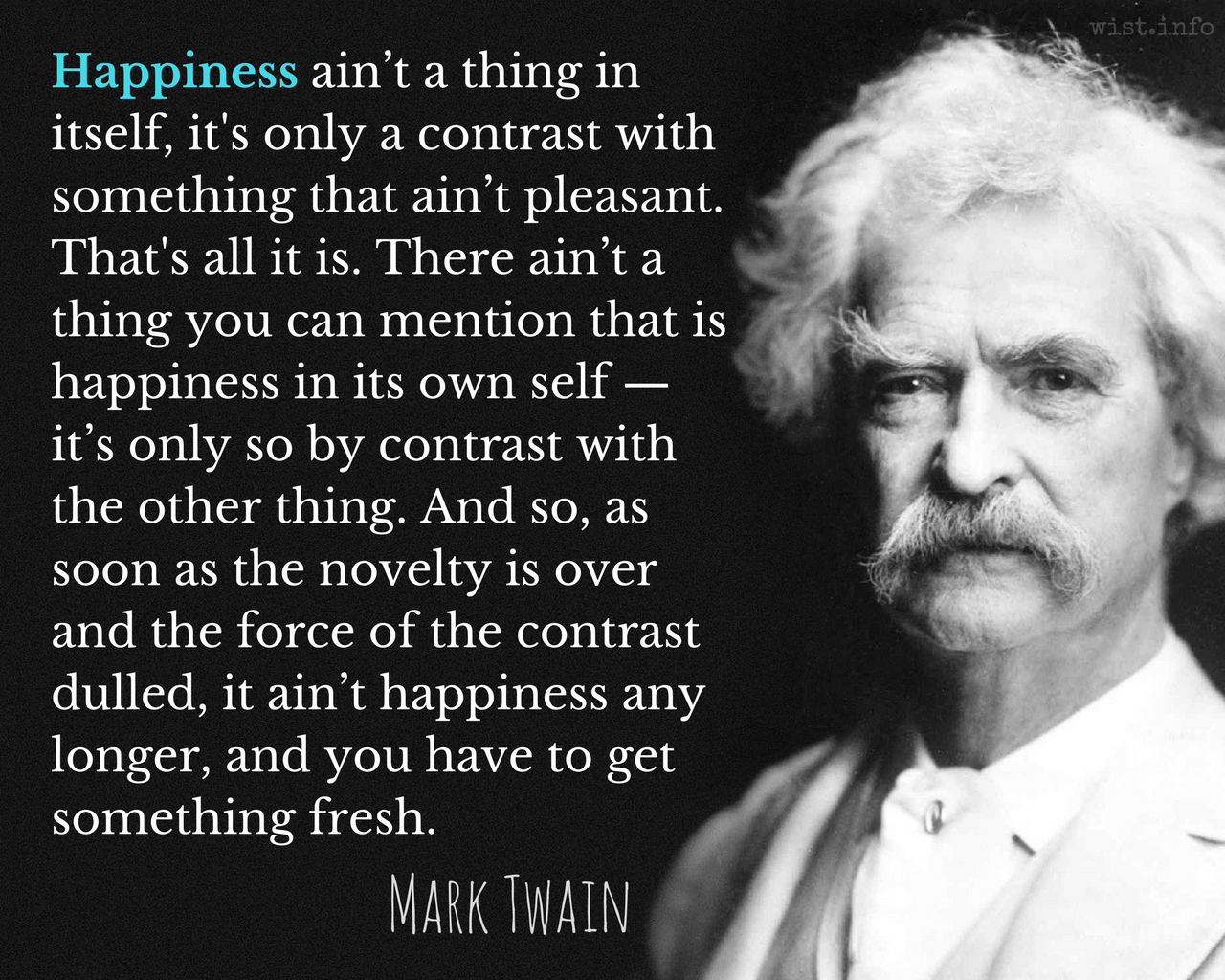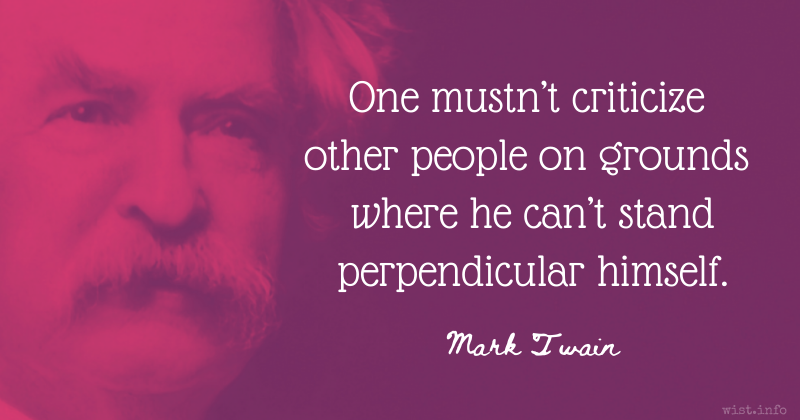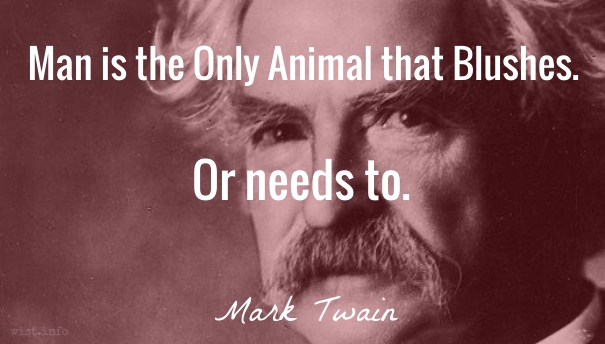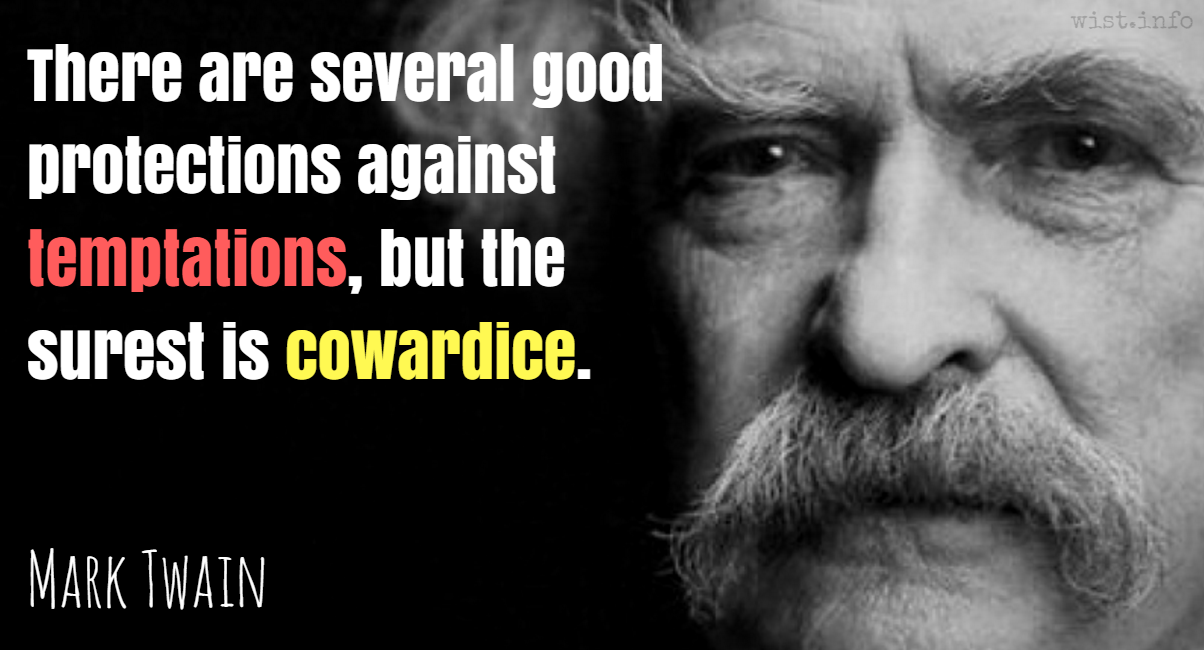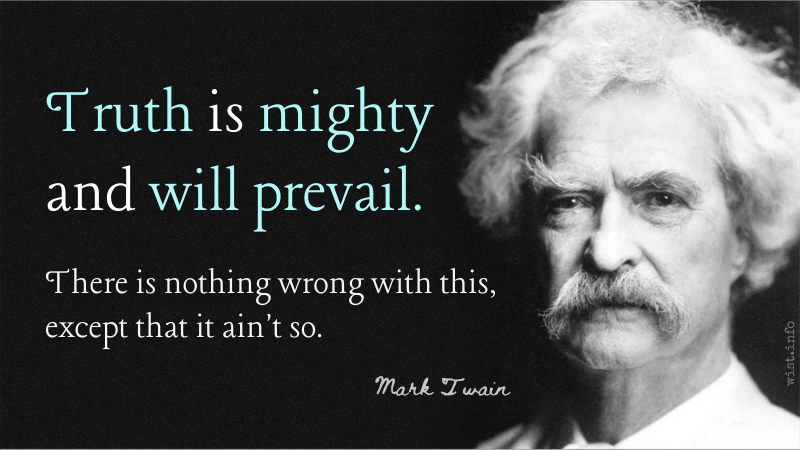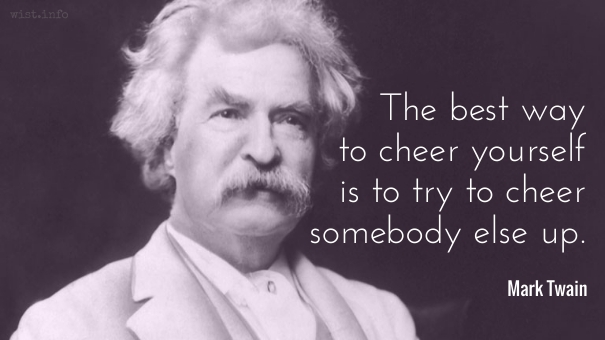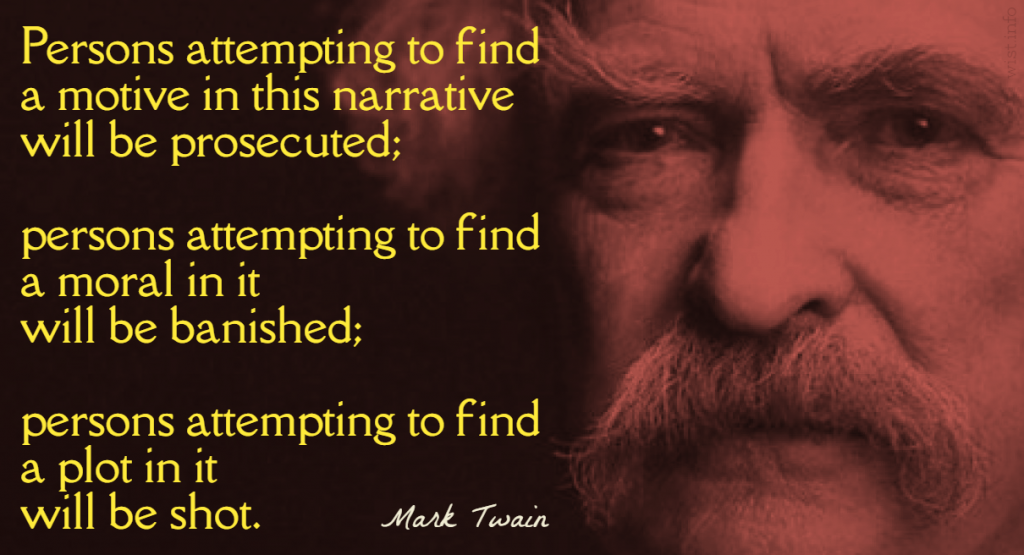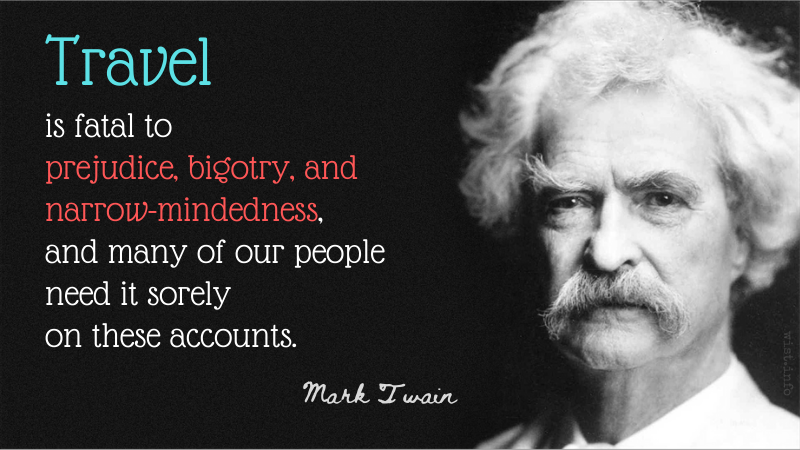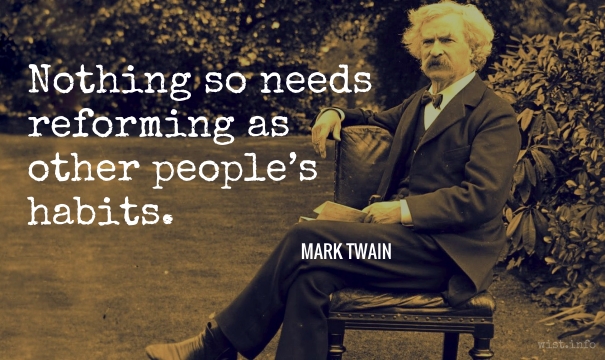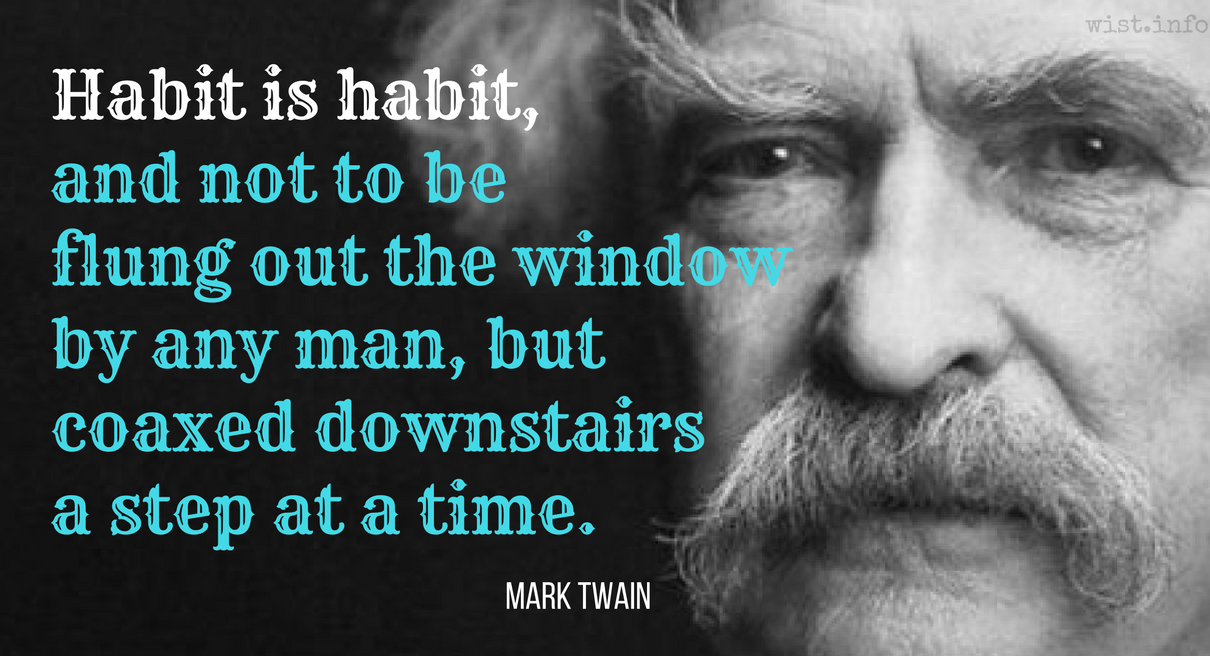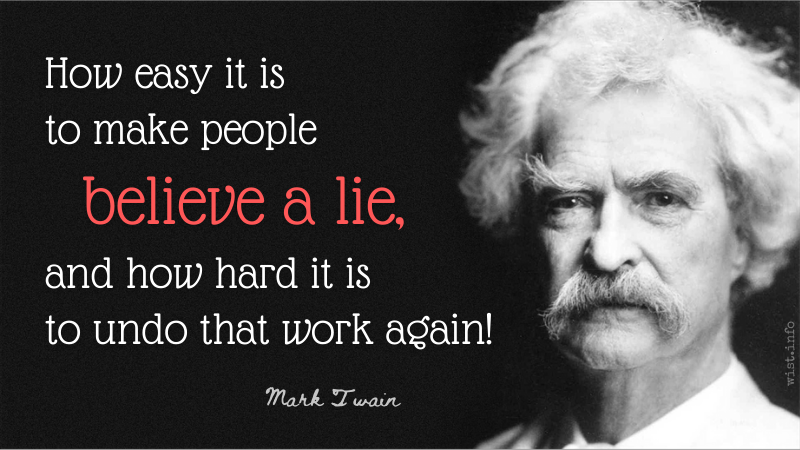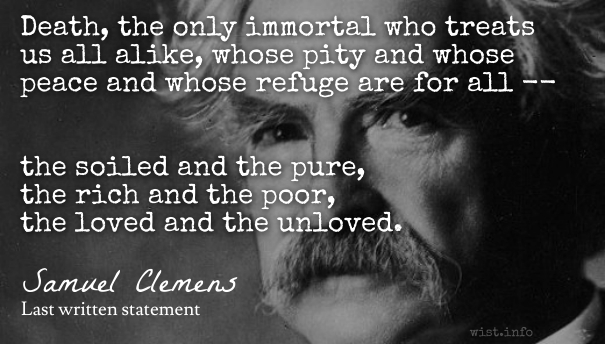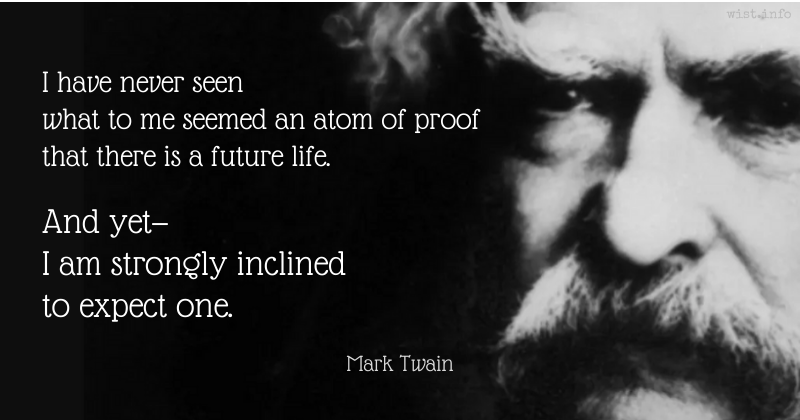A soiled baby, with a neglected nose, cannot be conscientiously regarded as a thing of beauty; and inasmuch as babyhood spans but three short years, no baby is competent to be a joy “forever.”
Mark Twain (1835-1910) American writer [pseud. of Samuel Clemens]
“Answers to Correspondents,” Sketches New and Old (1875)
(Source)
Ostensibly in response to a "Young Mother" who had written that her new baby was a thing of beauty and a joy forever.
Quotations by:
Twain, Mark
I haven’t a particle of confidence in a man who has no redeeming petty vices whatsoever.
Mark Twain (1835-1910) American writer [pseud. of Samuel Clemens]
“Answers to Correspondents,” The Californian (17 Jun 1865)
(Source)
Reprinted in The Celebrated Jumping Frog of Calaveras County, and Other Sketches (1867).
Happiness ain’t a thing in itself, it’s only a contrast with something that ain’t pleasant. That’s all it is. There ain’t a thing you can mention that is happiness in its own self — it’s only so by contrast with the other thing. And so, as soon as the novelty is over and the force of the contrast dulled, it ain’t happiness any longer, and you have to get something fresh.
I am quite sure that (bar one) I have no race prejudice, and I think I have no color prejudices, nor caste prejudices. Indeed, I know it. I can stand any society. All I care to know is that a man is a human being — that is enough for me; he can’t be any worse.
How little a thing can make us happy when we feel that we have earned it.
Never put off till tomorrow what you can do day after tomorrow just as well.
Mark Twain (1835-1910) American writer [pseud. of Samuel Clemens]
“Memoranda: The Late Benjamin Franklin,” epigraph, The Galaxy Magazine (Jul 1870)
(Source)
Offered as a faux Franklin maxim, in an essay where Twain mocked veneration of Franklin's biography and supposedly original aphorisms.
More background on this quotation: Never Put Off Till Tomorrow What You Can Do The Day After Tomorrow Just As Well – Quote Investigator.
Now is the accepted time to make your regular annual good resolutions. Next week you can begin paving hell with them as usual.
Mark Twain (1835-1910) American writer [pseud. of Samuel Clemens]
“New Year’s Day,” Virginia City Territorial Enterprise (c. 1 Jan 1864)
(Source)
New Year’s is a harmless annual institution, of no particular use to anybody save as a scapegoat for promiscuous drunks, and friendly calls, and humbug resolutions, and we wish you to enjoy it with a looseness suited to the greatness of the occasion.
Mark Twain (1835-1910) American writer [pseud. of Samuel Clemens]
“New Year’s Day,” Virginia City Territorial Enterprise (Jan 1864)
(Source)
Look at the tyranny of party — at what is called party allegiance, party loyalty — a snare invented by designing men for selfish purposes — and which turns voters into chattels, slaves, rabbits, and all the while their masters, and they themselves are shouting rubbish about liberty, independence, freedom of opinion, freedom of speech, honestly unconscious of the fantastic contradiction; and forgetting or ignoring that their fathers and the churches shouted the same blasphemies a generation earlier when they were closing their doors against the hunted slave, beating his handful of humane defenders with Bible texts and billies, and pocketing the insults and licking the shoes of his Southern Master.
Your race, in its poverty, has unquestionably one really effective weapon — laughter. Power, Money, Persuasion, Supplication, Persecution — these can lift at a colossal humbug, — push it a little — crowd it a little — weaken it a little, century by century: but only Laughter can blow it to rags and atoms at a blast. Against the assault of Laughter nothing can stand. You are always fussing and fighting with your other weapons. Do you ever use that one? No; you leave it lying rusting. As a race, do you ever use it at all? No; you lack sense and the courage.
Mark Twain (1835-1910) American writer [pseud. of Samuel Clemens]
“The Chronicle of Young Satan” (c.1897–1900, unfinished)
(Source)
Often paraphrased: "The human race has one really effective weapon, and that is laughter." This is an excised passage from what was eventually posthumously published as No. 44, The Mysterious Stranger (1916).
The modern patriotism, the true patriotism, the only rational patriotism is loyalty to the nation all the time, loyalty to the government when it deserves it.
A sin takes on new and real terrors when there seems a chance that it is going to be found out. This gives it a fresh and most substantial and important aspect.
Mark Twain (1835-1910) American writer [pseud. of Samuel Clemens]
“The Man That Corrupted Hadleyburg,” ch. 4 (1899)
(Source)
When you have prayed for victory you have prayed for many unmentioned results which follow victory — must follow it, cannot help but follow it. Upon the listening spirit of God the Father fell also the unspoken part of the prayer. He commandeth me to put it into words. Listen!
“O Lord our Father, our young patriots, idols of our hearts, go forth to battle — be Thou near them! With them — in spirit — we also go forth from the sweet peace of our beloved firesides to smite the foe. O Lord our God, help us to tear their soldiers to bloody shreds with our shells; help us to cover their smiling fields with the pale forms of their patriot dead; help us to drown the thunder of the guns with the shrieks of their wounded, writhing in pain; help us to lay waste their humble homes with a hurricane of fire; help us to wring the hearts of their unoffending widows with unavailing grief; help us to turn them out roofless with their little children to wander unfriended the wastes of their desolated land in rags and hunger and thirst, sports of the sun flames of summer and the icy winds of winter, broken in spirit, worn with travail, imploring Thee for the refuge of the grave and denied it — for our sakes who adore Thee, Lord, blast their hopes, blight their lives, protract their bitter pilgrimage, make heavy their steps, water their way with their tears, stain the white snow with the blood of their wounded feet! We ask it, in the spirit of love, of Him Who is the Source of Love, and Who is the ever-faithful refuge and friend of all that are sore beset and seek His aid with humble and contrite hearts. Amen.”
Each nation knowing it has the only true religion and the only sane system of government, each despising all the others, each an ass and not suspecting it.
From his cradle to his grave a man never does a single thing which has any FIRST AND FOREMOST object but one — to secure peace of mind, spiritual comfort, for HIMSELF.
I have seen several entirely sincere people who thought they were (permanent) Seekers after Truth. They sought diligently, persistently, carefully, cautiously, profoundly, with perfect honesty and nicely adjusted judgment — until they believed that without doubt or question they had found the Truth.
That was the end of the search. The man spent the rest of his life hunting up shingles wherewith to protect his Truth from the weather. If he was seeking after political Truth he found it in one or another of the hundred political gospels which govern men in the earth; if he was seeking after the Only True Religion he found it in one or another of the three thousand that are on the market. In any case, when he found the Truth he sought no further; but from that day forth, with his soldering-iron in one hand and his bludgeon in the other he tinkered its leaks and reasoned with objectors.
Humor is the great thing, the saving thing. The minute it crops up, all our irritations and resentments slip away and a sunny spirit takes their place.
Mark Twain (1835-1910) American writer [pseud. of Samuel Clemens]
“What Paul Bourget Thinks of Us?” (1899)
(Source)
What, sir, would the people of this earth be without woman? They would be scarce, sir. Mighty scarce.
Mark Twain (1835-1910) American writer [pseud. of Samuel Clemens]
“Women, a Eulogy of the Fair Sex,” Speech at the Correspondents Club, Washington, DC (11 Jan 1868)
(Source)
The speech (responding to a toast) was printed on 13 January in the Washington Star. The last sentence (or, in some cases, "Almighty scarce") was apparently added later in Twain's published speeches.
Variant: "What would men be without women? Scarce, sir, mighty scarce."
Clothes make the man. Naked people have little or no influence on society.
Mark Twain (1835-1910) American writer [pseud. of Samuel Clemens]
(Attributed)
First found in Merle Johnson, More Maxims of Mark (1927), and generally considered authentic. More info here.
The trouble ain’t that there is too many fools, but that the lightning ain’t distributed right.
Mark Twain (1835-1910) American writer [pseud. of Samuel Clemens]
(Attributed)
(Source)
Found in Merle Johnson, More Maxims of Mark (1927), and generally considered authentic.
Keep away from people who try to belittle your ambitions. Small people always do that, but the really great make you feel that you, too, can become great.
The reports of my death are greatly exaggerated.
Mark Twain (1835-1910) American writer [pseud. of Samuel Clemens]
(Paraphrase)
(Source)
This was based on a statement Mark Twain made to a British correspondent of the New York Journal (in some incorrect versions the New York Evening Sun) who tracked him down in London upon reports in America that Twain was dying there. Twain wrote out a note saying, "James Ross Clemens, a cousin of mine, was seriously ill two or three weeks ago in London but is well now. The report of my illness grew out of his illness; the report of my death was an exaggeration." This response was published 2 June 1897, and the longhand note is still preserved.
In 1906, Twain recalled the incident for his memoir that he told the reporter, "Say the report is exaggerated." On retyping the manuscript some months later, he scribbled the word "greatly" in front of "exaggerated," and it was published that way in The North American Review.
In Albert B. Paine's Mark Twain, a Biography, Vol. 2, ch. 197 (1912), the story is that Twain told the correspondent, "Just say the report of my death has been grossly exaggerated."
Further discussion:
When I was a boy of fourteen, my father was so ignorant I could hardly stand to have the old man around. But when I got to be twenty-one, I was astonished at how much the old man had learned in seven years.
Censorship is telling a man he can’t eat steak because a baby can’t chew it.
Mark Twain (1835-1910) American writer [pseud. of Samuel Clemens]
(Spurious)
Unsourced in Twain's writings. Likely derived from this Heinlein quotation.
Twenty years from now you will be more disappointed by the things that you didn’t do than by the ones you did do. So throw off the bowlines. Sail away from the safe harbor. Catch the trade winds in your sails. Explore. Dream. Discover.
Mark Twain (1835-1910) American writer [pseud. of Samuel Clemens]
(Spurious)
A common "inspirational" quote, frequently attributed to Twain, but not found in writings. Earliest found is in H. Jackson Brown, P.S. I Love You (1990), attributed to Brown's mother. More info here.
A person who won’t read has no advantage over one who can’t read.
Mark Twain (1835-1910) American writer [pseud. of Samuel Clemens]
(Spurious)
First attributed to Twain in 1945, but not found in his works. Earliest appearances of the quote date back to 1910, but are unattributed. It's often attributed to Abigail Van Buren (Dear Abby), but she didn't say it until 1966. See here for more information. Variants:
- "Who can see the barely perceptible line between the man who can not read at all and the man who does not read at all? The literate who can, but does not, read, and the illiterate who neither does nor can? [Original form.]
- "The person who does not read has no advantage over the person who cannot read." ["Dear Abby", 19 Oct 1966]
- "The man who doesn't read good books has no advantage over the man who can't read them."
The coldest winter I ever spent was a summer in San Francisco.
Mark Twain (1835-1910) American writer [pseud. of Samuel Clemens]
(Spurious)
Frequently attributed to Twain, but undocumented in any of his writings. The origin of the phrase seems to be in a letter from Horace Walpole to Mary Berry (29 Jul 1789), attributing a quip to the English actor James Quin:
Quin, being once asked if he had ever seen so bad a winter, replied, “Yes, just such an one last summer!” -- and here is its youngest brother!
Twain, in turn, mentioned the observation in a letter to Lucius Fairchild (28 Apr 1880), using it to denigrate Paris, France:
For this long time I have been intending to congratulate you fervently upon your translation to -- to -- anywhere -- for anywhere is better than Paris. Paris the cold, Paris the drizzly, Paris the rainy, Paris the Damnable. More than a hundred years ago, somebody asked Quin, "Did you ever see such a winter in all your life before?" "Yes," said he, "last summer." I judge he spent his summer in Paris.
When "coldest winter ... summer" phrase first achieved popularity in that form (around 1900 or earlier), the targeted city was Duluth, Minnesota, followed by other cities in Minnesota and Wisconsin, before being grafted onto San Francisco and, again, Mark Twain.
More discussion about this quotation:
Never argue with a fool; onlookers may not be able to tell the difference.
Mark Twain (1835-1910) American writer [pseud. of Samuel Clemens]
(Spurious)
Frequently attributed to Twain and also to Immanuel Kant (but never, in either case, with any citation). The phrase first makes recognizable (if anonymous) appearance in the late 19th Century; attributions to Twain begin in the late 1990s. See also Proverbs 26:4. For more discussion (and a shout-out to WIST) see here.
It’s better to keep your mouth shut and appear stupid than to open it and remove all doubt.
Mark Twain (1835-1910) American writer [pseud. of Samuel Clemens]
(Spurious)
This quotation, and close variants, are frequently attributed to Twain or Abraham Lincoln, but appears to have first been phrased this way by Maurice Switzer, Mrs. Goose, Her Book (1906): "It is better to remain silent at the risk of being thought a fool, than to talk and remove all doubt of it." Another point of origin is in the Bible, Proverbs 17:28: "Even a fool, when he holdeth his peace, is counted wise: and he that shutteth his lips is esteemed a man of understanding." See here for more information.
When the rich rob the poor it’s called business. When the poor fight back it’s called violence.
Mark Twain (1835-1910) American writer [pseud. of Samuel Clemens]
(Spurious)
Frequently, but incorrectly attributed to Twain, no earlier than 2015. It appears to have been an anonymous phrase coined in the Occupy Movement in 2011. See here for more information.
It ain’t those parts of the Bible that I can’t understand that bother me, it is the parts that I do understand.
Mark Twain (1835-1910) American writer [pseud. of Samuel Clemens]
(Spurious)
This is not found in any of Twain's printed works, and the first version of it appeared in 1915, after Twain's death. The folksy use of "ain't" doesn't show up until the mid-1970s. For more discussion, see here.
One mustn’t criticize other people on grounds where he can’t stand perpendicular himself.
Mark Twain (1835-1910) American writer [pseud. of Samuel Clemens]
A Connecticut Yankee in King Arthur’s Court, ch. 26 “The First Newspaper” (1889)
(Source)
To be vested with enormous authority is a fine thing; but to have the onlooking world consent to it is a finer.
Mark Twain (1835-1910) American writer [pseud. of Samuel Clemens]
A Connecticut Yankee in King Arthur’s Court, ch. 8 “The Boss” (1889)
(Source)
But don’t you know, there are some things that can beat smartness and foresight? Awkwardness and stupidity can. The best swordsman in the world doesn’t need to fear the second best swordsman in the world; no, the person for him to be afraid of is some ignorant antagonist who has never had a sword in his hand before; he doesn’t do the thing he ought to do, and so the expert isn’t prepared for him; he does the thing he ought not to do: and often it catches the expert out and ends him on the spot.
Mark Twain (1835-1910) American writer [pseud. of Samuel Clemens]
A Connecticut Yankee in King Arthur’s Court, ch. 34 (1889)
(Source)
Origin of more simplified versions of the phrase. More discussion: The Best Swordsman in the World Doesn’t Need To Fear the Second Best Swordsman – Quote Investigator.
Life does not consist mainly — or even largely — of facts and happenings. It consists mainly of the storm of thoughts that is forever blowing through one’s head.
Mark Twain (1835-1910) American writer [pseud. of Samuel Clemens]
Autobiography, Part 1, sec. 28 “New York, January 10, 1906” (2003)
Full text.
Let us consider that we are all partially insane. It will explain us to each other; it will unriddle many riddles; it will make clear and simple many things which are involved in haunting and harassing difficulties and obscurities now.
Those of us who are not in the asylum, and not demonstrably due there, are nevertheless, no doubt, insane in one or two particulars. I think we must admit this; but I think that we are otherwise healthy-minded. I think that when we all see one thing alike, it is evidence that, as regards that one thing, our minds are perfectly sound. Now there are really several things which we do all see alike; things which we all accept, and about which we do not dispute. For instance, we who are outside of the asylum all agree that water seeks its level; that the sun gives light and heat; that fire consumes; that fog is damp; that six times six are thirty-six, that two from ten leaves eight; that eight and seven are fifteen. These are, perhaps, the only things we are agreed about; but, although they are so few, they are of inestimable value, because they make an infallible standard of sanity. Whosoever accepts them him we know to be substantially sane; sufficiently sane; in the working essentials, sane. Whoever disputes a single one of them him we know to be wholly insane, and qualified for the asylum.
Very well, the man who disputes none of them we concede to be entitled to go at large. But that is concession enough. We cannot go any further than that; for we know that in all matters of mere opinion that same man is insane — just as insane as we are; just as insane as Shakespeare was. We know exactly where to put our finger upon his insanity: it is where his opinion differs from ours.
Mark Twain (1835-1910) American writer [pseud. of Samuel Clemens]
Christian Science, Book 1, ch. 5 (1907)
(Source)
When I, a thoughtful and unblessed Presbyterian, examine the Koran, I know that beyond any question every Mohammedan is insane; not in all things, but in religious matters. When a thoughtful and unblessed Mohammedan examines the Westminster Catechism, he knows that beyond any question I am spiritually insane. I cannot prove to him that he is insane, because you never can prove anything to a lunatic — for that is a part of his insanity and the evidence of it. He cannot prove to me that I am insane, for my mind has the same defect that afflicts his. All Democrats are insane, but not one of them knows it; none but the Republicans and Mugwumps know it. All the Republicans are insane, but only the Democrats and Mugwumps can perceive it. The rule is perfect: in all matters of opinion our adversaries are insane.
Mark Twain (1835-1910) American writer [pseud. of Samuel Clemens]
Christian Science, ch. 5 (1907)
(Source)
Often misattributed to Oscar Wilde.
There’s no end to the list; there are millions of them! And all insane; each in his own way; insane as to his pet fad or opinion, but otherwise sane and rational. This should move us to be charitable towards one another’s lunacies. I recognize that in his special belief the Christian Scientist is insane, because he does not believe as I do; but I hail him as my mate and fellow, because I am as insane as he insane from his point of view, and his point of view is as authoritative as mine and worth as much. That is to say, worth a brass farthing. Upon a great religious or political question, the opinion of the dullest head in the world is worth the same as the opinion of the brightest head in the world — a brass farthing. How do we arrive at this? It is simple. The affirmative opinion of a stupid man is neutralized by the negative opinion of his stupid neighbor — no decision is reached; the affirmative opinion of the intellectual giant Gladstone is neutralized by the negative opinion of the intellectual giant Newman — no decision is reached. Opinions that prove nothing are, of course, without value any but a dead person knows that much. This obliges us to admit the truth of the unpalatable proposition just mentioned above — that, in disputed matters political and religious, one man’s opinion is worth no more than his peer’s, and hence it followers that no man’s opinion possesses any real value. It is a humbling thought, but there is no way to get around it: all opinions upon these great subjects are brass-farthing opinions.
Mark Twain (1835-1910) American writer [pseud. of Samuel Clemens]
Christian Science, ch. 5 (1907)
(Source)
We despise all reverences and all objects of reverence which are outside the pale of our list of sacred things. And yet, with strange inconsistency, we are shocked when other people despise and defile the things which are holy to us.
We should be careful to get out of an experience only the wisdom that is in it — and stop there; lest we be like the cat that sits down on a hot stove-lid. She will never sit down on a hot stove-lid again — and that is well; but also she will never sit down on a cold one anymore.
Truth is stranger than fiction, but it is because Fiction is obliged to stick to possibilities; Truth isn’t.
Mark Twain (1835-1910) American writer [pseud. of Samuel Clemens]
Following the Equator, ch. 15, epigraph, “Pudd’nhead Wilson’s New Calendar” (1897)
(Source)
Sometimes paraphrased, "Why shouldn't truth be stranger than fiction? Fiction, after all, has to make sense." More on this quotation and its variants here.
It is by the goodness of God that in our country we have those three unspeakably precious things: freedom of speech, freedom of conscience, and the prudence never to exercise either of them.
Mark Twain (1835-1910) American writer [pseud. of Samuel Clemens]
Following the Equator, ch. 20, Epigraph (1897)
(Source)
Cited as from Pudd'nhead Wilson's New Calendar. Sometimes misquoted "... never to practice either."
“Classic.” A book which people praise and don’t read.
Mark Twain (1835-1910) American writer [pseud. of Samuel Clemens]
Following the Equator, ch. 25, epigraph (1897)
(Source)
Man is the Only Animal that Blushes. Or needs to.
Mark Twain (1835-1910) American writer [pseud. of Samuel Clemens]
Following the Equator, ch. 27, epigraph (1897)
(Source)
There are several good protections against temptations, but the surest is cowardice.
Mark Twain (1835-1910) American writer [pseud. of Samuel Clemens]
Following the Equator, ch. 36, epigraph (1897)
(Source)
Grief can take care of itself, but to get the full value of a joy you must have someone to divide it with.
Mark Twain (1835-1910) American writer [pseud. of Samuel Clemens]
Following the Equator, ch. 48, epigraph (1897)
(Source)
There are two times in a man’s life when he should not speculate: when he can’t afford it, and when he can.
Mark Twain (1835-1910) American writer [pseud. of Samuel Clemens]
Following the Equator, ch. 56, epigraph (1897)
(Source)
Do something every day that you don’t want to do; this is the golden rule for acquiring the habit of doing your duty without pain.
Mark Twain (1835-1910) American writer [pseud. of Samuel Clemens]
Following the Equator, ch. 58, epigraph (1897)
See here for more discussion about this (and related) quotations.
Don’t part with your illusions. When they are gone you may still exist, but you have ceased to live.
Mark Twain (1835-1910) American writer [pseud. of Samuel Clemens]
Following the Equator, ch. 59, epigram (1897)
(Source)
Everyone is a moon and has a dark side which he never shows to anybody.
Mark Twain (1835-1910) American writer [pseud. of Samuel Clemens]
Following the Equator, ch. 66, epigraph (1897)
(Source)
To arrive at a just estimate of a renowned man’s character one must judge it by the standards of his time, not ours. Judged by the standards of one century, the noblest characters of an earlier one lose much of their luster; judged by the standards of today, there is probably no illustrious man of four or five centuries ago whose character could meet the test at all points.
Mark Twain (1835-1910) American writer [pseud. of Samuel Clemens]
Joan of Arc, “Translator’s Preface” (1860)
(Source)
Man is the religious animal. He is the only religious animal. He is the only animal that has the True Religion — several of them. He is the only animal that loves his neighbor as himself and cuts his throat, if his theology isn’t straight. He has made a graveyard of the globe in trying his honest best to smooth his brother’s path to happiness and heaven.
Man seems to be a rickety poor sort of a thing, any way you take him; a kind of British Museum of infirmities and inferiorities. He is always undergoing repairs. A machine that was as unreliable as he is would have no market.
Mark Twain (1835-1910) American writer [pseud. of Samuel Clemens]
Letters from the Earth, “The Damned Human Race,” sec. 5 “The Lowest Animal” (1962) [ed. DeVoto]
(Source)
Whoo-oop! I’m the old original iron-jawed, brass-mounted, copper-bellied corpse-maker from the wilds of Arkansaw. — Look at me! I’m the man they call Sudden Death & General Desolation! Sired by a hurricane, dam’d by an earthquake, half-brother to the cholera, nearly related to the small-pox on the mother’s side! Look at me! I take nineteen alligators and a bar’l of whiskey for breakfast when I’m in robust health, and a bushel of rattlesnakes and a dead body when I’m ailing! I split the everlasting rocks with my glance, and I squench the thunder when I speak! Whoo-oop! Stand back and give me room according to my strength! Blood’s my natural drink, and the wails of the dying is music to my ear! Cast your eye on me, gentlemen! — and lay low and hold your breath, for I’m bout to turn myself loose!
We asked a passenger who belonged there what sort of place it was. “Well,” said he, after considering, and with the air of one who wishes to take time and be accurate, “It’s a hell of a place.” A description which was photographic for exactness.
Mark Twain (1835-1910) American writer [pseud. of Samuel Clemens]
Life on the Mississippi, ch. 30 (1883)
(Source)
Describing Arkansas City, Arkansas.
After nine months of familiarity with this panorama, I still think, as I thought in the beginning, that this is the fairest picture on our planet, the most enchanting to look upon, the most satisfying to the eye and the spirit. To see the sun sink down, drowned on his pink and purple and golden floods, and overwhelm Florence with tides of color that make all the sharp lines dim and faint and turn the solid city to a city of dreams, is a sight to stir the coldest nature, and make a sympathetic one drunk with ecstasy.
Mark Twain (1835-1910) American writer [pseud. of Samuel Clemens]
Mark Twain’s Autobiography, “Chapters Added in Florence (1904)” (1924) [ed. Bigelow]
(Source)
Recounting his previous stay in, and view of, Florence, Italy, starting in 26 September 1892; written while again staying there in 1904.
There has only been one Christian. They caught Him and crucified Him early.
Mark Twain (1835-1910) American writer [pseud. of Samuel Clemens]
Mark Twain’s Notebook (1933) [ed. Paine]
(Source)
Truth is mighty and will prevail. There is nothing wrong with this, except that it ain’t so.
Mark Twain (1835-1910) American writer [pseud. of Samuel Clemens]
Mark Twain’s Notebook (1935) [ed. Albert Bigelow Paine]
(Source)
With an entry for 4 Jul 1893. The core phrase, from the Latin "Magna est veritas et prævalebit," was first formulated in English by Thomas Brooks. An earlier variant can be found in Cicero, Pro Caelio Rufo (56 BC): "How great is the power of truth" [O magna vis veritas].
The first thing I want to teach is disloyalty. … This will beget independence — which is loyalty to one’s best self and principles, and this is often disloyalty to the general idols and fetishes.
The best way to cheer yourself is to try to cheer somebody else up.
Mark Twain (1835-1910) American writer [pseud. of Samuel Clemens]
Mark Twain’s Notebook [ed. Paine (1935)]
Often given as "The best way to cheer yourself up is to try to cheer somebody else up." More discussion here.
There is a charm about the forbidden that makes it unspeakably desirable.
Mark Twain (1835-1910) American writer [pseud. of Samuel Clemens]
Mark Twain’s Notebook [ed. Paine (1935)]
(Source)
If all men were rich, all men would be poor.
Mark Twain (1835-1910) American writer [pseud. of Samuel Clemens]
Mark Twain’s Noteook (1935 ed) [ed. Paine]
(Source)
What are the proper proportions of a maxim? A minimum of sound to a maximum of sense.
Mark Twain (1835-1910) American writer [pseud. of Samuel Clemens]
More Tramps Abroad, Epigraph, ch. 23 (1897)
(Source)
Each of you, for himself, by himself and on his own responsibility, must speak. And it is a solemn and weighty responsibility, and not lightly to be flung aside at the bullying of pulpit, press, government, or the empty catch-phrases of politicians. Each must for himself alone decide what is right and what is wrong, and which course is patriotic and which isn’t. You cannot shirk this and be a man. To decide against your convictions is to be an unqualified and inexcusable traitor, both to yourself and to your country, let men label you as they may. If you alone of all the nation shall decide one way, and that way be the right way according to your convictions of the right, you have done your duty by yourself and by your country — hold up your head! You have nothing to be ashamed of.
Against our traditions we are now entering upon an unjust and trivial war, a war against a helpless people, and for a base object — robbery. At first our citizens spoke out against this thing, by an impulse natural to their training. Today they have turned, and their voice is the other way. What caused the change? Merely a politician’s trick — a high-sounding phrase, a blood-stirring phrase which turned their uncritical heads: Our Country, right or wrong! An empty phrase, a silly phrase. It was shouted by every newspaper, it was thundered from the pulpit, the Superintendent of Public Instruction placarded it in every schoolhouse in the land, the War Department inscribed it upon the flag. And every man who failed to shout it or who was silent, was proclaimed a traitor — none but those others were patriots. To be a patriot, one had to say, and keep on saying, “Our Country, right or wrong,” and urge on the little war. Have you not perceived that that phrase is an insult to the nation?
For in a republic, who is “the Country”? Is it the Government which is for the moment in the saddle? Why, the Government is merely a servant — merely a temporary servant; it cannot be its prerogative to determine what is right and what is wrong, and decide who is a patriot and who isn’t. Its function is to obey orders, not originate them. Who, then, is “the country?” Is it the newspaper? Is it the pulpit? Is it the school-superintendent? Why, these are mere parts of the country, not the whole of it; they have not command, they have only their little share in the command. They are but one in the thousand; it is in the thousand that command is lodged; they must determine what is right and what is wrong; they must decide who is a patriot and who isn’t.
When there was room on the ledge outside of the pot s and boxes for a cat, the cat was there — in sunny weather — stretched at full length, asleep and blissful, with her furry belly to the sun and a paw curved over her nose. Then the house was complete, and its contentment and peace were made manifest to the world by this symbol, whose testimony is infallible. A home without a cat — and a well-fed, well-petted, and properly revered cat — may be a perfect home, perhaps, but how can it prove title?
Mark Twain (1835-1910) American writer [pseud. of Samuel Clemens]
Pudd’nhead Wilson, ch. 1 (1894)
(Source)
Persons attempting to find a motive in this narrative will be prosecuted; persons attempting to find a moral in it will be banished; persons attempting to find a plot in it will be shot.
— By Order of the AuthorMark Twain (1835-1910) American writer [pseud. of Samuel Clemens]
The Adventures of Huckleberry Finn, “Notice” (1884)
(Source)
He had discovered a great law of human action, without knowing it — namely, that in order to make a man or a boy covet a thing, it is only necessary to make the thing difficult to attain. If he had been a great and wise philosopher, like the writer of this book, he would now have comprehended that Work consists of whatever a body is obliged to do, and that Play consists of whatever a body is not obliged to do. And this would help him to understand why constructing artificial flowers or performing on a tread-mill is work, while rolling ten-pins or climbing Mont Blanc is only amusement.
Although my book is intended mainly for the entertainment of boys and girls, I hope it will not be shunned by men and women on that account, for part of my plan has been to try to pleasantly remind adults of what they once were themselves, and of how they felt and thought and talked, and what queer enterprises they sometimes engaged in.
We recognize that there are no trivial occurrences in life if we get the right focus on them.
Mark Twain (1835-1910) American writer [pseud. of Samuel Clemens]
The Autobiography of Mark Twain, Vol. 1 (2010)
(Source)
What a wee little part of a person’s life are his acts and his words! His real life is led in his head, and is known to none but himself. All day long, and every day, the mill of his brain is grinding, and his thoughts (which are but the mute articulation of his feelings,) not those other things, are his history. His acts and his words are merely the visible thin crust of his world, with its scarred snow summits and its vacant wastes of water — and they are so trifling a part of his bulk! a mere skin enveloping it. The mass of him is hidden — it and its volcanic fires that toss and boil, and never rest, night nor day. These are his life, and they are not written, and cannot be written. Every day would make a whole book of eighty thousand words — three hundred and sixty-five books a year. Biographies are but the clothes and buttons of the man — the biography of the man himself cannot be written.
Mark Twain (1835-1910) American writer [pseud. of Samuel Clemens]
The Autobiography of Mark Twain, Vol. 1 (2010)
(Source)
I thoroughly disapprove of duels. I consider them unwise, and I know they are dangerous. Also, sinful. If a man should challenge me now, I would got to that man and take him kindly and forgivingly by the hand and lead him to a quiet, retired spot, and kill him.
Mark Twain (1835-1910) American writer [pseud. of Samuel Clemens]
The Autobiography of Mark Twain, Vol. 1, 1864 (2010)
(Source)
Seen paraphrased: "I thoroughly disapprove of duels. If a man should challenge me, I would take him kindly and forgivingly by the hand and lead him to a quiet place and kill him."
It is curious that physical courage should be so common in the world, and moral courage so rare.
Mark Twain (1835-1910) American writer [pseud. of Samuel Clemens]
The Autobiography of Mark Twain, Vol. 2, 15 January 1907 (2010)
(Source)
A strange and vanity-devoured, detestable woman! I do not believe I could ever learn to like her except on a raft at sea with no other provisions in sight.
Mark Twain (1835-1910) American writer [pseud. of Samuel Clemens]
The Autobiography of Mark Twain, Vol. 3, 3 July 1908 (2010)
(Source)
History never repeats itself, but the Kaleidoscopic combinations of the pictured present often seem to be constructed of the broken fragments of antique legends.
Mark Twain (1835-1910) American writer [pseud. of Samuel Clemens]
The Gilded Age: A Tale of To-Day, ch. 47 (1874) [with Charles Dudley Warner]
(Source)
Probably the source of the Twain misquote "History does not repeat itself, but it rhymes" (which does not appear prior to 1970).
More discussion of this quotation: History Does Not Repeat Itself, But It Rhymes – Quote Investigator
Travel is fatal to prejudice, bigotry, and narrow-mindedness, and many of our people need it sorely on these accounts. Broad, wholesome, charitable views of men and things can not be acquired by vegetating in one little corner of the earth all one’s lifetime.
Mark Twain (1835-1910) American writer [pseud. of Samuel Clemens]
The Innocents Abroad, “Conclusion” (1869)
(Source)
Virtue has never been as respectable as money.
Mark Twain (1835-1910) American writer [pseud. of Samuel Clemens]
The Innocents Abroad, ch. 23 (1869)
(Source)
It used to be a good hotel, but that proves nothing — I used to be a good boy, for that matter. Both of us have lost character of late years.
Mark Twain (1835-1910) American writer [pseud. of Samuel Clemens]
The Innocents Abroad, ch. 57 (1869)
(Source)
I know your race. It is made up of sheep. It is governed by minorities, seldom or never by majorities. It suppresses its feelings and its beliefs and follows the handful that makes the most noise. Sometimes the noisy handful is right, sometimes wrong; but no matter, the crowd follows it. The vast majority of the race, whether savage or civilized, are secretly kind-hearted and shrink from inflicting pain, but in the presence of the aggressive and pitiless minority they don’t dare to assert themselves. Think of it! One kind-hearted creature spies upon another, and sees to it that he loyally helps in iniquities which revolt both of them. Speaking as an expert, I know that ninety-nine out of a hundred of your race were strongly against the killing of witches when that foolishness was first agitated by a handful of pious lunatics in the long ago. And I know that even to-day, after ages of transmitted prejudice and silly teaching, only one person in twenty puts any real heart into the harrying of a witch. And yet apparently everybody hates witches and wants them killed. Some day a handful will rise up on the other side and make the most noise — perhaps even a single daring man with a big voice and a determined front will do it — and in a week all the sheep will wheel and follow him, and witch-hunting will come to a sudden end.
He liked to like people, therefore people liked him.
Mark Twain (1835-1910) American writer [pseud. of Samuel Clemens]
The Personal Recollections of Joan of Arc, ch. 16 (1896)
(Source)
Courage is resistance to fear, mastery of fear — not absence of fear. Except a creature be part coward it is not a compliment to say it is brave; it is merely a loose application of the word.
When there was room on the ledge outside of the pots and boxes for a cat, the cat was there — in sunny weather — stretched at full length, asleep and blissful, with her furry belly to the sun and a paw curved over her nose. Then that house was complete, and its contentment and peace were made manifest to the world by this symbol, whose testimony is infallible. A home without a cat — and a well-fed, well-petted, and properly revered cat — may be a perfect home, perhaps, but how can it prove title?
Mark Twain (1835-1910) American writer [pseud. of Samuel Clemens]
The Tragedy of Pudd’nhead Wilson, ch. 1 (1894)
(Source)
October: This is one of the peculiarly dangerous months to speculate in stocks. The others are: July, January, September, April, November, May, March, June, December, August, and February.
Adam was but human — this explains it all. He did not want the apple for the apple’s sake, he wanted it only because it was forbidden. The mistake was in not forbidding the serpent; then he would have eaten the serpent.
Habit is habit, and not to be flung out the window by any man, but coaxed downstairs a step at a time.
Mark Twain (1835-1910) American writer [pseud. of Samuel Clemens]
The Tragedy of Pudd’nhead Wilson, ch. 6, Epigraph “Pudd’nhead Wilson’s Calendar” (1894)
(Source)
The holy passion of friendship is so sweet and steady and loyal and enduring in nature that it will last through a whole lifetime, if not asked to lend money.
Mark Twain (1835-1910) American writer [pseud. of Samuel Clemens]
The Tragedy of Pudd’nhead Wilson, ch. 8, epigraph (1894)
(Source)
But, on the other hand, Uncle Abner said that the person that had took a bull by the tail once had learnt sixty or seventy times as much as a person that hadn’t, and said a person that started in to carry a cat home by the tail was gitting knowledge that was always going to be useful to him, and warn’t ever going to grow dim or doubtful.
Mark Twain (1835-1910) American writer [pseud. of Samuel Clemens]
Tom Sawyer Abroad (1894)
Full text.
Variants sometimes seen:
- The man who sets out to carry a cat by its tail learns something that will always be useful and which never will grow dim or doubtful.
- A man who carries a cat by the tail learns something he can learn in no other way.
But, on the other hand, Uncle Abner said that the person that had took a bull by the tail once had learnt sixty or seventy times as much as a person that hadn’t, and said a person that started in to carry a cat home by the tail was gitting knowledge that was always going to be useful to him, and warn’t ever going to grow dim or doubtful.
Mark Twain (1835-1910) American writer [pseud. of Samuel Clemens]
Tom Sawyer Abroad, ch. 10 (1894)
(Source)
Frequently misquoted as "A man who carries a cat by the tail learns something he can learn in no other way."
I have found out that there ain’t no surer way to find out whether you like people or hate them than to travel with them.
Mark Twain (1835-1910) American writer [pseud. of Samuel Clemens]
Tom Sawyer Abroad, ch. 11 “The Sand-Storm” (1905)
(Source)
How easy it is to make people believe a lie, and how hard it is to undo that work again!
Mark Twain (1835-1910) American writer [pseud. of Samuel Clemens]
Dictation (2 Dec 1906), The Autobiography of Mark Twain, Vol. 2 (2013)
(Source)
A sentiment that may be behind the spurious Twain quotation, "It's easier to fool people than to convince them that they have been fooled."
It is a dear and lovely disposition, and a most valuable one, that can brush away indignities and discourtesies and seek and find the pleasanter features of an experience.
Mark Twain (1835-1910) American writer [pseud. of Samuel Clemens]
In The North American Review (1906)
(Source)
In trying circumstances, urgent circumstances, desperate circumstances, profanity affords a relief denied even to prayer.
Mark Twain (1835-1910) American writer [pseud. of Samuel Clemens]
In Albert Bigelow Paine, Mark Twain: A Biography, ch. 38 (1912)
(Source)
Death, the only immortal who treats us all alike, whose pity and whose peace and whose refuge are for all — the soiled and the pure, the rich and the poor, the loved and the unloved.
Mark Twain (1835-1910) American writer [pseud. of Samuel Clemens]
Last written note
(Source)
Recorded by A. Paine (his literary executor), Mark Twain: A Biography, Vol III, Part 2, ch. 293 (1912).
Compliments make me vain: & when I am vain, I am insolent & overbearing. It is a pity, too, because I love compliments. I love them even when they are not so. My child, I can live on a good compliment two weeks with nothing else to eat.
Mark Twain (1835-1910) American writer [pseud. of Samuel Clemens]
Letter to Gertrude Natkin (1906-03-02)
(Source)
In a similar vein, his biographer, Albert Bigelow Paine, in Mark Twain: A Biography, Vol. 4, ch. 250 (1912), recalled Clemens saying: "I can live for two months on a good compliment."
But the truth is, that when a Library expels a book of mine and leaves an unexpurgated Bible lying around where unprotected youth and age can get hold of it, the deep unconscious irony of it delights me and doesn’t anger me.
Mark Twain (1835-1910) American writer [pseud. of Samuel Clemens]
Letter to Mrs. F. G. Whitmore (1907-02-07)
(Source)
All you need in this life is ignorance and confidence; then success is sure.
Mark Twain (1835-1910) American writer [pseud. of Samuel Clemens]
Letter to Mrs. Foote (1887-12-02)
(Source)
First reprinted, upon the letter's rediscovery, in The Los Angeles Times (1930-03-16). A facsimile of the discovered letter (with the above punctuation) can be found in B. DeCasseres, When Huck Finn Went Highbrow (1934).
For more discussion about this quotation's origin: All You Need In This Life Is Ignorance and Confidence; Then Success Is Sure – Quote Investigator®.
Unexpected money is a delight. The same sum is a bitterness when you expected more.
Mark Twain (1835-1910) American writer [pseud. of Samuel Clemens]
Letter to Orion Clemens (23 Mar 1878)
(Source)
It is my heart-warm and world-embracing Christmas hope and aspiration that all of us — the high, the low, the rich, the poor, the admired, the despised, the loved, the hated, the civilized, the savage — may eventually be gathered together in a heaven of everlasting rest and peace and bliss — except the inventor of the telephone.
Mark Twain (1835-1910) American writer [pseud. of Samuel Clemens]
Letter to the Editor of the New York World (23 Dec 1890)
(Source)
Loyalty to petrified opinions never yet broke a chain or freed a human soul in this world — and never will.
As to a hereafter, we have not the slightest evidence that there is any — no evidence that appeals to logic and reason. I have never seen what to me seemed an atom of proof that there is a future life. And yet — I am strongly inclined to expect one.
Mark Twain (1835-1910) American writer [pseud. of Samuel Clemens]
Quoted in Albert Bigelow Paine, Mark Twain: A Biography, Vol. 4, ch. 264 (1922)
(Source)
But I never was happy, never could make a good impromptu speech without several hours to prepare it.
Mark Twain (1835-1910) American writer [pseud. of Samuel Clemens]
Speech, Society of the Army of the Tennessee Annual Meeting, Chicago (12 Nov 1879)
(Source)
Twain made quips along this line several times, though there is no evidence he said the more frequently quoted "It usually takes more than three weeks to prepare a good impromptu speech." For more discussion, see here.


